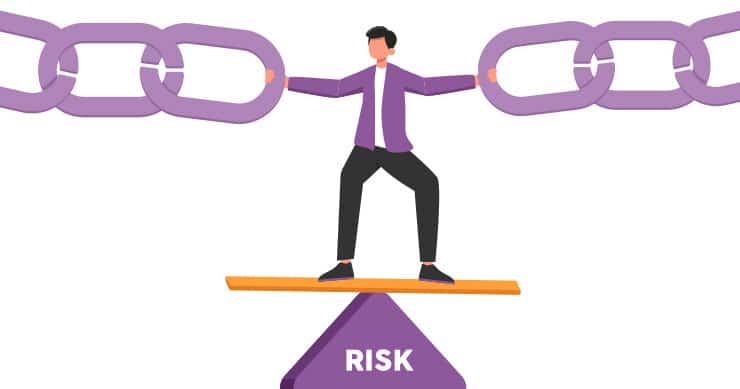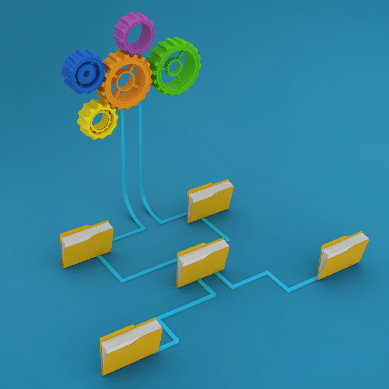A supply chain is a delicate structure composed of multiple companies, decision-makers, and suppliers all working together to get things moving. Every link in the chain is a potential point of failure, as any vendor that doesn’t pull its weight poses a financial and operational threat to the whole operation.
Supply chain risks have always been a growing threat. In fact, they’ve been spiking significantly these past few years, putting management teams on their toes regarding the next major attack. In order to address all these potential threats, businesses that operate supply chains must undergo supplier compliance management.

Why Is Vendor Compliance Necessary?
Supply chains today are at significant risk, and working cohesively with third-party suppliers to address those risks can be a challenge as well. Vendor compliance is keeping those suppliers on board with risk management and mitigation, and there are several risks to look out for in that regard:
- International regulations: One of the most high-profile examples is the European Union’s GDPR regarding the handling of citizen data. Any suppliers suffering from data breaches and other cybersecurity-related accidents may result in the entire supply chain becoming non-compliant with these regulations.
- Outdated software: Vendors use a wide variety of software in their daily operations. If that software isn’t patched to the latest security version, then you run the risk of malware infecting the supply chain. Check out the patch management process in each of the suppliers you work with.
- Manual processes: Part of the reason why so many companies insist that their partners and vendors adopt software-based management solutions is to reduce the number of paper processes involved. Manual management increases the chance of lost records and human error in data entry among other problems.
- Inexperienced employees: Staff training is always a major component in compliance. Staff members must know how to interact with your compliance initiatives and be wary of the risks facing supply chains today, such as phishing attacks that directly target inexperienced employees.
Supply chain regulatory compliance is a complicated matter thanks to the vast number of risks involved and the difficulty in working with your individual suppliers.
Start Getting Value With
Centraleyes for Free
See for yourself how the Centraleyes platform exceeds anything an old GRC
system does and eliminates the need for manual processes and spreadsheets
to give you immediate value and run a full risk assessment in less than 30 days
The Process of Establishing Vendor Compliance Management
As supply chains become globalized and even more complex, the need for a formal vendor risk management program becomes even more pressing. Let’s talk about implementing such a strategy into your workflow.
First, put some thought into your service level agreements (SLAs). These documents are an opportunity to establish new controls regarding the security of your suppliers. By expecting them to implement certain risk-mitigating controls, you can reduce the overall risk of the supply chain this way and can hold vendors individually accountable for their own risks.
A supply chain security risk assessment may be necessary at this point, and it’s not uncommon to see businesses passing out IT security questionnaires for their individual business partners for this reason. These surveys essentially outline the current risk and security posture and determine next steps for addressing any risks. Outdated manual questionnaires are currently being replaced by automated risk management software, saving companies hundreds of hours and easing collaboration.
And don’t forget to establish proper communications with your vendors. All suppliers must be receptive and responsive to your comments and questions. Whether we’re talking about a quick phone call or a fully featured digital portal for sharing information, communication is key when it comes to getting vendors to work with you on supply chain compliance.
Some other miscellaneous tips to cover here include:
- Move your focus beyond just legal compliance and look at what your customers, investors, and the rest of the market expect of you and your supply chain. Does the vendor align with the values of your organization?
- Be sure to mention key performance indicators (KPIs) with your supplier. What exact metrics are measurable ways to measure success? For instance, you could aim for a better corporate resilience program by measuring how quickly and comprehensively a vendor is able to respond to incidents after they happen.
- Remember that data analytics is exactly how you’ll measure and identify supply chain risks and how exposed your organization is. Take the time to collect accurate and insight-rich data from your vendors.
From vendor onboarding to gathering centralized data across your entire supply chain, the use of software is practically a necessity now for ensuring supply chain compliance.
Germany’s Supply Chain Integrity Act
The “Supply Chain Integrity Act,” passed on March 3, 2021, marks a significant stride in fortifying human rights across global supply chains, with implications that resonate particularly with German companies. Designed to make the globalization of supply chains more socially responsible, the law mandates rigorous due diligence in international supply chains, addressing concerns such as human rights violations, forced labor, and environmental degradation. German companies, integral players in international supply chains, face new supply chain regulatory compliance measures based on their size, with enforcement starting from January 1, 2023, for those with at least 3,000 employees and extending to companies with 1,000 employees from January 1, 2024.
As German companies navigate the implementation, the law demands a thorough evaluation of supply chain security risk assessment and due diligence programs, emphasizing a clear responsibility structure to address potential risks in human rights and environmental protection swiftly. Experts hail it as a comprehensive response to the growing demand for responsible business practices, aligning with the broader trend of Environmental Social and Governance (ESG) consciousness.
Around the World and Into Your Bed or Salad
Ever wondered about the incredible journey your cozy blanket or that premium olive oil embarks on before finding its place in your home? Picture that plush blanket, patiently crafted and shipped from a distant textile haven. Or that bottle of premium olive oil, carefully selected from groves worldwide and delivered to your kitchen.
But, and there’s always a ‘but,’ right? Behind this grand adventure lurk challenges. Some of our favorite items might carry the weight of labor exploitation or environmental strain. It’s like the unseen plot twist in a thrilling novel — the dark side of the journey that the “Supply Chain Integrity Act” is here to rewrite. The “Supply Chain Integrity Act revamps the script of global commerce. It’s asking companies to put human rights and ethical practices in the spotlight, making sure our cozy essentials don’t come with a hidden cost.
To achieve this, companies must delve into supplier compliance management’s intricacies.
This law will shape the future of vendor compliance management — a process where companies ensure their partners follow ethical guidelines, creating a seamless and responsible narrative.
Start Getting Value With
Centraleyes for Free
See for yourself how the Centraleyes platform exceeds anything an old GRC
system does and eliminates the need for manual processes and spreadsheets
to give you immediate value and run a full risk assessment in less than 30 days





